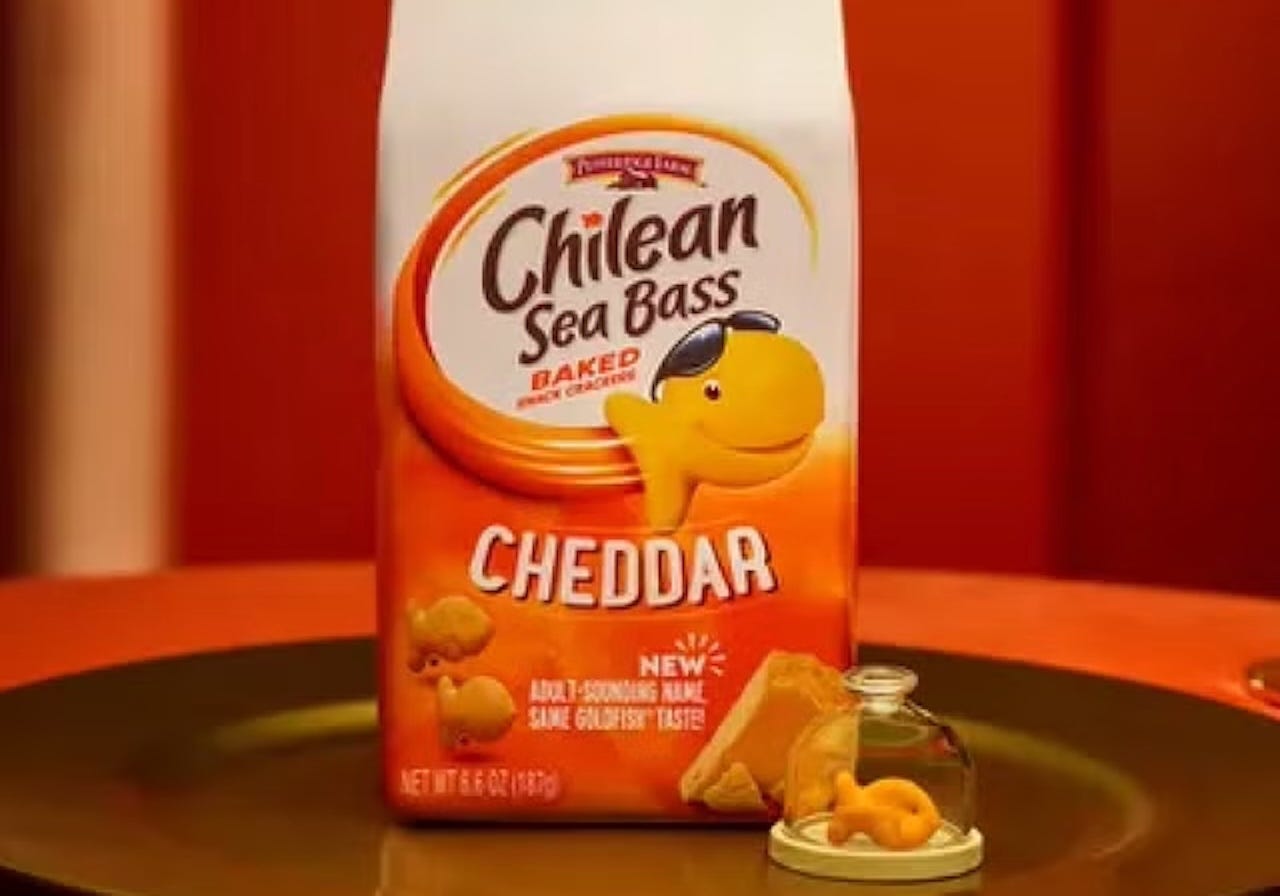Editor’s Note: I published a version of this a decade ago, and was reminded of it when I read a recent story about how Pepperidge Farm’s Goldfish crackers are going to be (temporarily) renamed Chilean Sea Bass. After non-stop election commentary for the past couple weeks, today’s post is a bit more ‘Roots.’
Frankenfood.
Fracking.
Star Wars.
Axis of Evil.
Evil Empire.
Shovel-Ready.
Obese.
Poverty.
Organic.
Sustainable.
Fair Trade.
Every one of these words and phrases generates some sort of gut check. Some are positive reactions, others are negative. Some elicit affinity, others revulsion. You’re instinctively drawn to side with some and against others, forming a first impression before even a gram of rationality or critical thought enters into the picture. And, as the saying goes, you never get a second chance to make a first impression.
There’s no great revelation here. Branding and marketing is as old as commerce itself, and it works. I’ve previously written about the re-labeling of foodstuffs in order to improve how the public perceives them.
Patagonian Toothfish became Chilean Sea Bass.
Rapeseed oil became Canola oil.
Muttonfish became Red Snapper.
Slimehead became Orange Roughy.
Chinese Gooseberry became Kiwi Fruit.
GORP became Trail Mix.
Countless companies we know have changed their names.
Philip Morris became Altria.
Kentucky Fried Chicken became KFC.
Lucky Goldstar became LG.
Service Games Company became Sega.
The Nashville Network became The National Network became Spike TV.
Valujet became AirTran.
First National City Bank became Citibank.
Travelers and became Citigroup.
Name- and label-marketing is all around us. We deal with it every day, we’re used to it, we expect those who look to sell us products or services to wrap them up in nice packaging. Are you more likely to hire AAA Plumbing or Sloppy Joe’s if your toilet springs a leak? Does dried plum remind you less of your grand-uncle’s gastric concerns than prune? Yet how many of us are as leery of branding and labeling when it comes to government and politics? Are we as aware of name games when debating public policy?
Government certainly goes all-in when it launches and names major programs and policy initiatives. Consider:
Head Start
USA PATRIOT Act
No Child Left Behind
Affordable Care Act
Bipartisan Campaign Reform Act
America COMPETES Act
HIRE Act
Healthy, Hunger Free Kids Act.
All are titles intended to invoke gut-level support and agreement, and all make for great soundbite to challenge those who oppose them. Are you really opposed to giving kids a Head Start? Don’t you care enough to make sure No Child gets Left Behind? What, you’re not a PATRIOT? Do you want kids to go Hungry? Are you so deep in corporate pockets that you oppose Campaign Reform?
Yet if you look into the nuts and bolts of many of these programs, and the empirical evidence of their outcomes and results, you’ll find many wouldn’t even come close to passing a truth-in-advertising test. Yet we have no choice but to call these programs by their given names, perpetuating the validation of their purpose. Only if a program gets unmasked as utterly farcical in outcome can the name backfire and become ironic, and even then, its supporters will still play the name game. The Affordable Care Act has become a running joke, yet its reflexive defenders still look to drive the word “affordable” home, and many of the less-engaged simply accept that the presence of the word “affordable” in the name means that it must be so. Similarly, the word “patriot” has been maligned by an associate with legislature that empowers the government to spy on citizens and to violate some of their rights. “Patriotism” has been linked with certain flavors of politics and a particular location on the political spectrum, so much so that people judge others’ patriotism by their left-right leanings.
What’s the point? We all know we’re being marketed to, by businesses, by charities, by the media, by political pundits, by the government – by anyone who wants to get some of your money, your time or your support. What is new is the speed with which information travels. As social media make it ever-easier to jump from topic to topic and issue to issue with a rat-at-at pace, the amount of information that’s received on each topic and each issue becomes less and less. This makes labels an ever-bigger part of overall message content, and makes it harder to counter-punch labels with long rebuttals. It’s said that in a bar fight, the guy who lands the first punch usually wins. Much can be said for naming something controversial – the guy who manages to hang the label that supports his viewpoint first ends up with a major advantage.
Pay extra care to names and labels. Don’t trust them, don’t give those who argue by using them a pass, and don’t allow associative tendencies to cloud your judgment of what’s inside the nicely-labeled package.



I think they broke the paradigm with the Inflation Reduction Act.
The power of an iconic brand name…
The Radio Corporation of America ceased to exist decades ago, but you can still buy TVs and other products whose otherwise anonymous manufacturers have licensed the RCA logo.